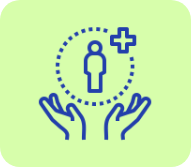





Gain early access to cutting-edge therapies that may not be available outside the trial.

Receive high-quality medical care from skilled healthcare professionals, including comprehensive oversight and personalized treatment plans.

Receive high-quality medical care from skilled healthcare professionals, including comprehensive oversight and personalized treatment plans.

Play a crucial role in advancing medical research and helping future generations.

Empower yourself by taking an active role in managing your health and well-being.
